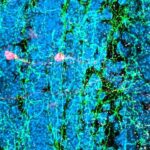Link to Pubmed [PMID] – 11090612
J. Neurosci. 2000 Dec;20(23):RC112
From mollusks to mammals the activation of cAMP response element-binding protein (CREB) appears to be an important step in the formation of long-term memory (LTM). Here we show that a 5 min exposure to a novel environment (open field) 1 hr after acquisition of a one-trial inhibitory avoidance training hinders both the formation of LTM for the avoidance task and the increase in the phosphorylation state of hippocampal Ser 133 CREB [phosphorylated CREB (pCREB)] associated with the avoidance training. To determine whether this LTM deficit is attributable to the reduced pCREB level, rats were bilaterally cannulated to deliver Sp-adenosine 3′, 5′-cyclic monophosphothioate (Sp-cAMPS), an activator of PKA. Infusion of Sp-Adenosine 3′,5′-cyclic monophosphothioate Sp-cAMPS to CA1 region increased hippocampal pCREB levels and restored normal LTM of avoidance learning in rats exposed to novelty. Moreover, a 5 min exposure to the open field 10 min before the avoidance training interferes with the amnesic effect of a second 5 min exposure to the open field 1 hr after avoidance training and restores the hippocampal levels of pCREB. In contrast, the avoidance training-associated activation of extracellular signal-regulated kinases (p42 and p44 mitogen-activated protein kinases) in the hippocampus is not altered by novelty. Together, these findings suggest that novelty regulates LTM formation by modulating the phosphorylation state of CREB in the hippocampus.


